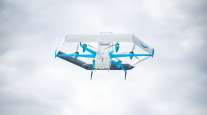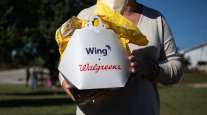Staff Reporter
Transportation Secretary Elaine Chao Announces Proposal Covering Drone Operations

WASHINGTON — The U.S. Department of Transportation is ready to issue a new proposed rule that will allow more freedom for people operating drones, according to Transportation Secretary Elaine Chao.
Chao, who delivered remarks Jan. 14 at the Transportation Research Board’s annual meeting, announced that the forthcoming proposed rule would allow drone operators to fly their machines at night and over the heads of people without special waivers if certain conditions are met. Such conditions include that the operator has received appropriate training, completed approved testing and has equipped the drone with anti-collision lighting.
Drone operators must adhere to some basic rules outlined by the Federal Aviation Administration when flying unmanned aerial vehicles. Current rules stipulate that they are not allowed to fly the craft above 400 feet, they cannot fly above moving traffic unless they have a special permit and they can only operate during daylight hours.
Chao said the proposed rule will be published in the Federal Register soon.
“Your feedback is very welcome,” she said. “The department is keenly aware that there are legitimate public concerns about drones concerning safety, security and privacy.”
.@USDOT Secretary @SecElaineChao takes the stage at #TRBAM2019 @NASEMTRB pic.twitter.com/iHSr6txEuP — Eleanor Lamb (@eleanorannlamb) January 14, 2019
Chao also announced that DOT plans to publish an Advance Notice of Proposed Rulemaking that aims to identify major drone safety and security issues. The proposal will ask for recommendations on issues that may pose a threat to other aircraft, people or national security.
The department also has selected three commercial service entities to develop technology to provide flight planning, communication and weather services for these drones.
“Taken together, these three initiatives will be a major step forward in enabling the safe development and testing of drones in this country,” Chao said.
DOT as a whole has demonstrated a focus on various autonomous technologies, including vehicles. Specifically, Chao mentioned two of the agency’s relatively recent documents — Automated Driving Systems: A Vision for Safety 2.0 and AV 3.0, the agency’s policy update of autonomous-vehicle technology guidelines.
Chao said these documents, each of which provides a framework for people developing and adopting such technologies, would not be possible without engagement from industry representatives.
“We need that engagement, and we asked for that engagement,” Chao said. “The department really applauds this transparency.”
Autonomous technology can take a variety of forms in transportation, from lane-departure warning systems and automated brakes to truck platooning. Automated technologies have, however, raised public concern over security and privacy. Chao in the past has reported that nearly three-fourths of American drivers have expressed fear and anxiety about riding in a self-driving vehicle.
Chao urged manufacturers and Silicon Valley technology leaders to help educate consumers in an effort to dispel apprehensions.
“The promise of automated vehicles will never be realized if the public does not have confidence in the safety, security and privacy of their technology,” Chao said. “The constraints to growth in this industry will be consumer acceptance.”
Chao’s appearance occurred on the 24th day of the federal government shutdown, which began Dec. 22. Chao had canceled her speaking engagement at CES, the annual electronics trade show in Las Vegas, that was scheduled just a few days before TRB’s meeting.
“During this particular time, there was some consideration as to whether we should hold this at all,” Chao said. “But, because of the importance of this conference and also the many, many attendees and participants who view this as a very important annual event, we have decided to go ahead with it.”




